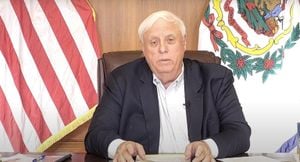Movie lovers, get ready for the gripping tale of intrigue and ambition unfurling within the sacred walls of the Vatican. Starting November 21, theaters will showcase "Conclave," the latest political thriller based on the novel of the same name by acclaimed English author Robert Harris. This film adaptation, directed by Edward Berger, tells the story of cardinals tasked with electing the successor to the deceased pope amid hidden secrets and fierce political maneuvering.
Set against the backdrop of the Vatican, the film presents Cardinal Lawrence, portrayed by the talented Ralph Fiennes, who grapples with his own doubts as he leads the conclave. Alongside him, the film features notable performances from Stanley Tucci as the progressive Cardinal Bellini, John Lithgow as the traditionalist Cardinal Tremblay, and Lucian Msamati as the Nigerian underdog, Cardinal Adeyemi. Each character carries their own baggage and ambitions, adding layers to the complex narrative.
The plot thickens as Cardinal Lawrence navigates the undercurrents of political intrigue. He faces the challenge of handling rivalries among the cardinals, culminating in intense scenes where hidden agendas threaten to disrupt the election process. The introduction of Cardinal Vincent Benitez, who arrives unexpectedly from Kabul, adds yet another twist to the story, injecting uncertainty and suspense.
Berger, who previously garnered acclaim for his adaptation of "All Quiet on the Western Front," brings immense depth to “Conclave” through both the script and direction. He designs the film as both thrilling and character-driven, allowing viewers to become engrossed in the dialogues and moral dilemmas faced by the clergy. With detailed cinematography showcasing the grand interiors of the Vatican, the movie immerses audiences within the hallowed halls where such significant decisions are made.
Critics have pointed out the film's humor and irony, which serve to lighten what is otherwise grave material. Despite the serious undertones of the elections, moments of levity punctuate the narrative. Fiennes, recognized as one of the highlights of the film, is praised for embodying the inner conflict of his character. He himself has emphasized the complexity of the cardinals, noting their imperfections and human flaws.
The technical aspects of the film have not gone unnoticed either. The work of cinematographer Stefan Fontaine is acclaimed for creating tension with static and moving shots, highlighting the emotional weight of the storyline. Music by Volker Bertelmann also elevates the atmosphere, generating suspense and reinforcing the high stakes at play.
Nevertheless, some viewers may find the pacing sluggish at times or question the film’s ambiguous ending, leading to varied opinions on the overall impact. The discourse surrounding the film indicates two clear perspectives: some viewers appreciate the slow-burn tension and the moral intricacies at play, whereas others might feel the final reveals leave something to be desired.
Despite the divide, the film has received praise across the board, with many describing it as beautifully crafted with standout performances. For example, Isabella Rossellini makes her presence known as Sister Agnes, operating within the male-dominated hierarchy. Critics have highlighted her ability to steal scenes, emphasizing her pivotal role, making her one of the few women present during the conclave.
Interestingly, amid all the political complexity, memes circulating on social media have dubbed the film humorously akin to “Mean Girls” set against the Vatican's backdrop. The comparisons reflect audiences' engagement with the dramatic aspects of the film, showcasing how the battle for the papacy can mirror the dynamics of social hierarchies and rivalries often found in popular reality television.
John Lithgow, who portrays Cardinal Tremblay, provides insightful commentary on the film’s exploration of ambition. He notes how the movie captures the tension between personal devotion and the cutthroat nature of the political scene within the Church. It resonates with broader themes seen not just within faith-based institutions but across political arenas worldwide.
The intersection of politics and personal faith keeps viewers engaged throughout the runtime of “Conclave.” It raises questions about morality, power, and the role of faith—a conversation likely to stimulate viewer reflection long after the credits roll. Such questions have long captured the imagination of storytellers and audiences alike.
“Conclave” deserves attention for its unique exploration of the human heart within the sacred conclave. With its deep character studies, political tension, and visual grandeur, the film positions itself as not just entertainment, but also as societal commentary relevant to contemporary discussions around power dynamics and governance.
Expect the unexpected as you enter the world of the Vatican where every vote holds the weight of centuries of tradition and controversy. "Conclave" opens soon, reminding audiences of how even the most sacred environments are filled with ambition, rivalry, and, yes, humanity.
Whether or not you’re well-versed in the workings of the Catholic Church, this film presents itself as engaging—not merely for its plot but for the performances of its cast. Anyone interested in drama, power struggles, and complex characters will find something to appreciate here. So, get ready to step inside the Vatican and experience the intense battle for the papacy.
If you're intrigued by the political machinations behind the holy scenes, mark “Conclave” as a must-watch. It's poised to leave audiences pondering the historical significance enveloped within the dramatic narrative.



